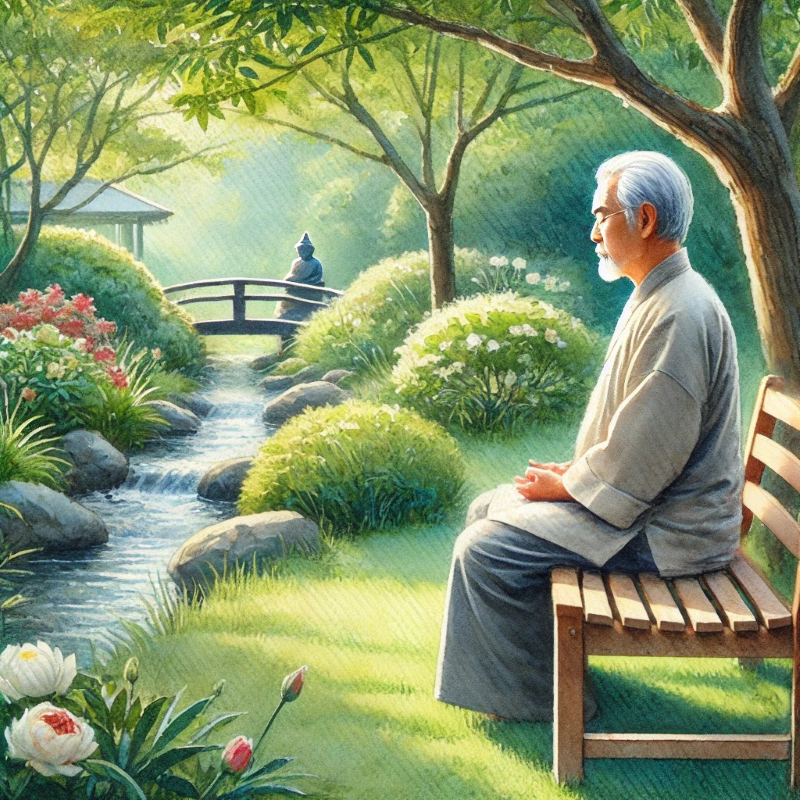Contemplative Practices for Parkinson’s

Introduction
In today’s fast-paced world, we often seek solace in familiar activities like arts and sports. But what if we also learned the art of contemplation as a way to enhance our lives, especially when faced with challenges like Parkinson’s disease? This idea, explored through various perspectives, offers a new approach to managing Parkinson’s by integrating contemplative practices into daily routines. This post will delve into how contemplative practices can be a transformative tool for those living with Parkinson’s, offering a pathway to improved mental, emotional, and physical wellbeing.
Understanding Contemplative Practices
Contemplative practices refer to a broad range of activities that engage the mind in self-reflection and transformation. These practices are not limited to mindfulness or yoga but include techniques that cultivate prosocial emotions, enhance imaginative capabilities, and foster a deeper understanding of oneself and the world.
Historically, contemplation was deeply integrated into daily life, intertwined with cultural, philosophical, and religious dimensions. However, over time, particularly since the 16th century, these practices have been marginalized, leading to a cultural estrangement from the very practices that could transform and enhance our lives. This post seeks to reacquaint individuals, particularly those with Parkinson’s, with these life-enhancing practices.
Contemplative Practices and Parkinson’s Disease
Parkinson’s disease, a progressive neurological disorder, presents various challenges, including motor symptoms such as tremors, stiffness, and bradykinesia (slowness of movement), alongside cognitive and emotional issues. Contemplative practices can play a crucial role in managing these symptoms by providing tools for stress relief, emotional regulation, and mental clarity.
Mindfulness: A Key Contemplative Practice for Parkinson’s
Mindfulness, one of the most well-known contemplative practices, involves paying attention to the present moment without judgment. For individuals with Parkinson’s, mindfulness can be particularly beneficial in managing stress and anxiety, common emotional responses to the disease.
By focusing on the breath or bodily sensations, mindfulness can help calm the nervous system and reduce the impact of stressors, improving overall emotional wellbeing. This practice can be especially useful during symptom flare-ups or when coping with the uncertainty of disease progression.
Exploring Other Contemplative Practices
Beyond mindfulness, other contemplative practices can also benefit those living with Parkinson’s. For instance:
- Bodily Awareness Practices: Techniques such as body scans or mindful movement can help individuals reconnect with their bodies, even as they experience changes in motor function. These practices can enhance bodily awareness, helping individuals better manage their physical symptoms.
- Guided Imagery: This imaginative practice allows individuals to mentally escape from the challenges of Parkinson’s by visualizing peaceful or positive scenarios. This can provide a sense of relief and mental relaxation, offering a temporary respite from the daily struggles of the disease.
- Focused Attention: Regularly practicing focused attention, such as concentrating on the breath, can sharpen cognitive skills like attention and memory. These benefits are crucial for those with Parkinson’s, as cognitive decline is a common aspect of the disease.
Integrating Contemplation into Parkinson’s Care
The integration of contemplative practices into the daily lives of those with Parkinson’s can significantly improve their quality of life. These practices can be incorporated through structured programs offered by healthcare providers, Parkinson’s support groups, or as part of a personal daily routine.
Caregivers and family members can also play a supportive role by participating in these practices, creating a nurturing and empathetic environment that encourages consistent practice.
Educational institutions and community centers can further support this integration by offering contemplative practices as part of their wellness programs for individuals with Parkinson’s. By creating spaces where these practices are valued and encouraged, we can help those with Parkinson’s tap into their inner strengths and resilience.
The Transferable Skills of Contemplative Practices
Just as arts and sports teach valuable life skills that extend beyond the activity itself, contemplative practices also offer transferable benefits. For instance:
- Selective Attention: Practices that focus on the breath or a specific thought train the mind to stay present, reducing the impact of distractions and improving focus.
- Emotional Regulation: Techniques like guided imagery or mindfulness help individuals manage their emotions more effectively, reducing stress and promoting emotional resilience.
- Intersubjective Awareness: Practices that involve imagining social scenarios or empathic responses can enhance social interactions, improving relationships and communication.
By developing these skills, individuals with Parkinson’s can better manage their symptoms and navigate daily life with greater ease and confidence.
Conclusion: A Call to Action
The integration of contemplative practices into Parkinson’s care offers a promising pathway to enhanced wellbeing. These practices, when performed regularly, can train the cognitive, emotional, imaginal, and physical aspects of being human, providing tools to better manage the challenges of Parkinson’s disease.
In a world filled with distractions and uncertainties, the need for contemplative practices is more pressing than ever. As we continue to explore their potential, it’s clear that these practices can become an integral part of holistic treatment approaches, empowering individuals with Parkinson’s to live fuller, more meaningful lives.
Disclaimer: AI-generated medical content is not a substitute for professional medical advice or diagnosis; I hope you found this blog post informative and interesting. www.parkiesunite.com by Parkie
SEO Keywords: Parkinson’s mindfulness, contemplative practices, Parkinson’s care, emotional resilience, Parkinson’s treatment
DALL-E Prompt: “A watercolor painting of a serene scene where an elderly person with Parkinson’s is seated on a bench in a peaceful garden, their eyes closed, engaged in a contemplative practice. The background features lush greenery, soft flowers, and a gentle stream flowing nearby, capturing a moment of calm and tranquility.”
The watercolor painting you requested has been created and is displayed above. It captures the serene moment of an elderly person with Parkinson’s engaged in contemplative practice in a peaceful garden. The lush greenery, soft flowers, and gentle stream convey a sense of calm and tranquility.